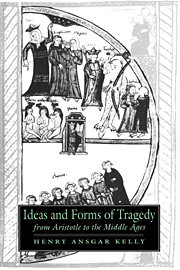6 - Final variations
Published online by Cambridge University Press: 22 September 2009
Summary
I begin the end of my general survey of ancient and medieval ideas of tragedy at the end of the fourteenth century. The most important development occurred in England, with Chaucer and his fifteenth-century disciples, Lydgate and Henryson. These authors are so significant in the history of tragedy that I shall devote a separate study to them: “Chaucerian Tragedy.” The reader may eventually find full details there, but I shall give a brief summary below, in order to round out our picture of ideas and forms of tragedy in the later Middle Ages. It will be followed by a look at the usages of French authors at the turn of the fifteenth century, specifically, William of Machaut, Eustace Deschamps, Christine de Pisan, and, most important, Philip of Mézières.
The other loci of tragedies or tragic theory at the end of the Middle Ages, apart from Belgium, where an odd joke-tragedy was composed by Reyner de Wael in 1447, are Italy and Spain. The Italians were inspired by Seneca, and, at least at the beginning, by Mussato's imitation of Seneca, and wrote tragedies in Latin verse on both contemporary and classical subjects. The Spaniards, centered around the marquis of Santillana, were aware of Seneca's plays, but were more influenced by the commentaries on Dante's Comedy in their ideas of tragedy. However, three vernacular authors of tragedies go their own way.
- Type
- Chapter
- Information
- Ideas and Forms of Tragedy from Aristotle to the Middle Ages , pp. 169 - 217Publisher: Cambridge University PressPrint publication year: 1993



